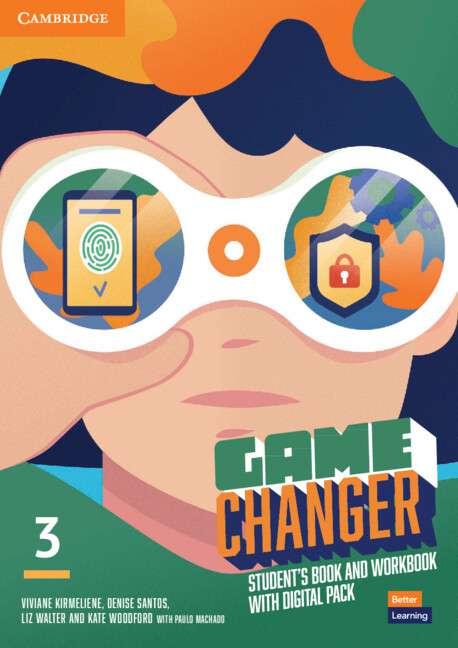
A Podcast about the Mental Health Benefits of Exercising p.24
Making, Refusing, and Accepting Invitations*
Pronunciation: Falling Intonation in Tag Questions
A Forum Post Giving Advice p.28
What are two things that make you happy?
Which piece of advice do you think is better?
Choose an artwork and think of four adjectives to describe it. Review p.29
2.2 Dealing With Emotions
A Dialogue about Spending and Making Money p.36
3.2
A Talk about Being Vegetarian p.46
Keeping a Conversation Going Pronunciation: have to and have: /f/ and /v/ p.40
An Advertisement* Think of three ads you like. What techniques do they use? Think about something you bought recently. Did it have a lot of packaging? Did it create a lot of waste?
Expressing Opinions*
Pronunciation: /aɪ/*
A Reply to a Comment on a Blog Post p.50

What are some environmental problems in your area?
What feature of the house of the future do you like best? Can you think of any disadvantages of living in this house?
Cambridge University Press 978-1-009-22018-7 Game Changer Level 3 Student's Book and Workbook with Digital Pack Series: Game Changer Table of Contents More Information www.cambridge.org © in this web service Cambridge University Press CONTENTS * This material can be downloaded from the Digital Resource Pack. UNIT VOCABULARYGRAMMARREADINGLISTENING SPEAKING AND PRONUNCIATION WRITING CRITICAL THINKING Welcome! p.4 1 My Life Plan p.9 1.1 Amazing People Life Stages p.10 Studying p.14 Will for Predictions and Be going to for Intentions p.13 Reflexive Pronouns p.15 A Blog: Studying English Abroad p.12 Around the World: Maori Teenager Becomes Language Influencer p.16 1.2 Being Bilingual A Video Class Giving Tips for Studying p.14 Expressing Certainty and Uncertainty Pronunciation: ’ll and will p.18 An Action Plan*Why do you think English is an official language in so many countries? Do you
to
English to
2 What Makes Us Happy? p.19 2.1 Happiness Around the World More Free-Time Activities p.20 Health and Fitness p.24 Should/ Shouldn’t for Advice p.23 Tag Questions p.25 An Online Advice Forum: The Teen Oracle p.22 Art: Can Making Art Make You Happy? p.26
think it’s important
know
exchange ideas with people around the world?
3 Consumer World
p.31 3.1 How We Sell Advertising p.32 Money p.36 Have to and Must: Affirmative and Negative p.35 Have to: Questions and Short Answers p.37
A Blog: Four Things We Must Not Forget About Ads p.34 Around the World: Rethinking Waste: Lessons from Japan p.38
The Problem With Plastic
4 We Can Save Our Planet p.41 4.1 Take Action Now The Environment p.42 Verbs and Phrases + Prepositions p.46 Zero Conditional and First Conditional p.45 May and Might for Possibility p.47
p.44
An Infographic: This is How Your “Green” House Will Look in 2040!
Literature: Poetry and the Environment: Haikus p.48
4.2 Inspired by Nature
Review p.51
Cambridge University Press
978-1-009-22018-7 Game Changer Level 3 Student's Book and Workbook with Digital Pack Series: Game Changer
An Informal Talk about Digital Footprints p.58
A Journal*What three words would you use to describe your online life? And your offline life?
In your opinion, should schools allow students to use cell phones in the classroom?
A Talk Show Interview with a Songwriter p.68
Showing Interest* Pronunciation: Rising Intonation in Yes/No

Questions
Two Song Reviews p.72
How important is music to you?
Why do you think a mother is worried about her son going to a big music concert? How would you reply to her?
How popular are hip-hop and hip-hop artists in your country?
Review p.73
7.1
p.76 Adjectives + Prepositions p.80
Africa
8 What’s Important to Me? p.85
8.1
What Motivates You?
Review p.95
Phrases with Do, Have, and Make p.86 Verbs + Prepositions p.90
Perfect with Already, Just, and Yet p.79
Present Perfect with Since and For p.81
Present Perfect vs. Simple Past p.89
Subject and Object
Questions p.91
An Online Magazine Article: Looking for Innovation? Here’s Africa for You p.78
Around the World: The Himba p.82
7.2
Fashion From Africa
A Pamphlet: Dilemma Teens p.88
Geography: Where Do the Happiest Teenagers in the World Live? p.92
8.2
Mindfulness and Meditation
A Podcast about a Movie from Angola p.80
Presenting New Information
Pronunciation: -ed Verbs: /t/, /d/, and /ɪd/ p.84
A Biography*What problems do you see around you and what inventions might help solve them?
Think about an indigenous society. What can they teach other societies?
Street Interviews about Volunteer Work p.90
Describing Past Experiences*
Pronunciation: Schwa in Unstressed Words and Syllables
A Write-up of an Interview p.94
How do you make decisions about things that are important in your life?
How happy do you think teenagers are in your country?
Reading: Around the World and Across the Curriculum p.98; Puzzles and Games p.102; Projects p.106; Irregular Verb List p.110; Workbook p.111
of
More Information www.cambridge.org © in this web service Cambridge University Press UNIT VOCABULARYGRAMMARREADINGLISTENING SPEAKING AND PRONUNCIATION WRITING CRITICAL THINKING 5 My Online Self p.53 5.1 Put Your Phone Down! Strong Adjectives p.54 The Internet p.58 Second Conditional p.57 Indefinite Pronouns p.59
Schools
Phones in the Classroom? p.56 Around the
Break from Social Media p.60 5.2 What’s
Social
Table
Contents
An Online Debate Site: Should
Allow Cell
World: Taking a
up With
Media
: /
Expressing Different Points of View Pronunciation
^ / p.62
6 The World of Music p.63 6.1 Feel the Music Types of Music p.64 Musical Instruments p.68 Present Perfect: Affirmative and Negative p.67 Present Perfect: Questions and Short Answers p.69
Memorable Night! p.66 Music: The
History of Hip-Hop p.70 6.2 The Schuhplattler
An Online Concert Review: BTS Rocks Green Alliance Arena for a
Early
7 Africa: Past, Present, and Future p.75
Amazing
Achievements
Present
Cambridge University Press
978-1-009-22018-7 Game Changer Level 3 Student's Book and Workbook with Digital Pack Series: Game Changer
Information
MY LIFE


UNIT GOALS
• Talk about life stages and studying.
• Read a blog about studying English abroad.

• Listen to a video class giving tips for studying.
• Learn about saving indigenous languages.
• Express certainty and uncertainty.
THINK!
1 What do you think is happening in the image?







2 Is learning English important for situations like the one in the image? Why / Why not?
VIDEO
1.1

1 Say three things in the video that are amazing.
2 Which invention helped us to connect the whole world?

www.cambridge.org © in this web service Cambridge University Press
Excerpt More
1
PLAN
LIFE STAGES
1.01 Read the quiz and match the words and phrases in bold with images 1–10. Then listen, check, and repeat.
A Will you go to college when you finish school?
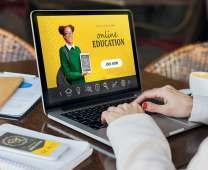




No way. I’ll get a job and earn my own money.



Yes, of course. I want to keep studying to learn more about the world.
I’m not sure. Maybe I’ll take acourse to get more practical skills.
B Which option best describes you?
To be happy I need to be able to help in my community.



I’ll never retire – I want to work for the rest of my life.
When I’m an adult, I want to get married and have children

C For you, what’s the most important thing about learning English?
It helps me make new friends. When I takean exam in English, I want to get a good score. It connects me with other people around the world.

D What worries you the most when you think about the future?
Not finding a job after I graduate Being alone when I leave home Pollution and climate change.
Cambridge University Press 978-1-009-22018-7
Changer Excerpt More Information www.cambridge.org © in this web service Cambridge University Press
Game Changer Level 3 Student's Book and Workbook with Digital Pack Series: Game
1 VOCABULARY IN CONTEXT 1 6 2 7 3 8 4 9 5 10 finish school
toDothequiz
Whatisthemost importantthingin yourlifeplan
findout. ?
Cambridge University Press
978-1-009-22018-7 Game Changer Level 3 Student's Book and Workbook with Digital Pack Series: Game Changer Excerpt More Information
Do the quiz and check (✓) your answers. Then look at your score below and discuss it with a partner. Do you agree with your results? Why? / Why not?
Most
answersare…

WORK people the world
You’re hard-working and always busy! You’ll be successful, but never forget that the people around you are very important, too.
You’re a sociable person and you love to be around people. That’s great, but remember: there’s a big world out there, too!
You think big and have great plans, but try to also find time for your private life. It’s important to have some fun!
Complete the chart with the words and phrases below.
• finish school• get a job • get married• go to college• graduate • have children• leave home• retire• take a course• take an exam WorkEducationFamily get a job
Complete the sentences so they are true for you. Use words and phrases from Exercise 3.
1 I’m going to before I leave home. 2 I think I’ll be busy when I
I’m going to after I .
I don’t think I’ll
I’m not going to before I’m 35. 6 When I , I’ll be really happy.
USE IT!
LOOK!
After when, before, and after to talk about the future, use the simple present, not will.
When I get a job, I’ll save some money.
Do you think going to college is important?
What do you want to do after you finish school?
Do you want to get married?
Work in pairs. Take turns asking and answering about your future. Replace the phrases in bold with the correct form of other words and phrases from Exercise 3. 5 Yes, I do. I want to take a course. I’m not sure.
www.cambridge.org © in this web service Cambridge University Press
2
4
3
4
5
ofyour
Themostimportant thinginyourlife planis…
3 UNIT
1
Cambridge University Press
978-1-009-22018-7 Game Changer Level 3 Student's Book and Workbook with Digital Pack Series: Game Changer Excerpt
More Information
READING
Learn&Live English
Let's welcome our new students Verónica González and Daniel Ribeiro!
Why Malta?
From: Mexico video games and sports
Some years ago I saw a video about the Maltese coast and I loved it! When I learned that English is one of the two official languages in Malta, I thought, “I want to study English there.”
Why South Africa?
Daniel, 15

From: Brazil languages and big animals
Most people speak English and Maltese here. I can’t speak Maltese, but I can read the street signs – because they use English, too!
Expectations
I think I’ll have a great time here in Malta. I’m going to take a four-week English course. Later, who knows? Will this experience help me get a job in the future? Maybe. I’d love to become a game developer, so maybe I’ll make games about Malta!
Expectations
My parents wanted me to study English abroad before I go to college, and my dream is to go on a safari, so we decided that South Africa seemed like the perfect place.
I found out that there are over ten official languages in South Africa. English is one of them and most people actually speak English as a second language here.
Read the text quickly and circle the sentences that are true.
1 The text is a magazine article about English courses in different countries.
2 There are three blog posts on the page.
I’m very excited about this course. We’re not going to sit in a classroom all day. Tomorrow our instructors are going to take us to a local village. We’re going to help build a school there. How cool is that?
ABOUT US
We offer a variety of English courses for teenagers (12–17) in different countries.
3 The people in the images are going to start an English course.
4 This website is for teenagers who want to study English abroad.

1.02 Read and listen to the text. Then answer the questions. Write V (Verónica), D (Daniel), or B (both).
Who …



1 likes wild animals? D
2 is in a country where English is one of the official languages?



3 is going to take a course that lasts for a month?
4 is going to do some community work as part of the course?
5 chose the country after talking to family members?
6 hopes that the experience abroad will be useful in the future?
Look at the words in bold in the blog post and circle the correct options in sentences 1–5.
Verónica
Daniel
1 “Maltese” refers to a language spoken in / person from Malta.
2 The word “they” refers to people from / street signsin Malta.
3 The word “over” means more than / on top of
4 The word “them” refers to official languages in / people from South Africa.
5 It is possible to replace “actually” with at the moment / in fact
THINK!
How many of these countries have English as an official language: Australia, Bahamas, Guyana, Ireland, Pakistan, Singapore, Uganda? Why do you think English is an official language in so many countries?
www.cambridge.org © in this web service Cambridge University Press
1 2 3
Verónica, 14
HOME | OUR COURSES | DESTINATIONS | STUDENT LIFE | BLOG | CONTACT US
Cambridge University Press
978-1-009-22018-7 Game Changer Level 3 Student's Book and Workbook with Digital Pack Series: Game Changer
Excerpt
More Information
LANGUAGE IN CONTEXT
Look at the examples below. Complete the sentences from the blog post.
Will for Predictions
Affirmative (+)
Negative (–)























I think I 1 a great time here in Malta.
I’m sure this course will teach Verónica a lot.
The classes won’t be boring. She probably won’t want to leave Malta!
Questions (?) 2 this experience me get a job?
Put the words in the correct order.
1 probably / I’ll / a / children / lot / have / of I’ll probably have a lot of children.
2 think / next / graduate / I / will / my / year / cousin
3 to / are / retire / my / going / soon / grandparents
4 you’ll / better / maybe / tomorrow / feel
5 next Monday / we’re / have / going / not / to / classes
Begoingto for Intentions
Our instructors 3 us to a village. He’s going to help build a house.
We 4 in a classroom all day. Bill is not going to spend the summer here.
When are you going toleave South Africa?
LOOK!
We often use will with Ibelieve, I(don’t)think, I’msure, maybe, perhaps, probably. Maybe one day I’ll visit Malta.
Look at Daniel’s diary for next week. Complete the sentences with the correct form of begoingto.
weekly planner
MondayTuesdayWednesdayThursdayFridaySaturday & Sunday
classes until 12:30 11:15 go bird watching
classes until 12:30 go bike riding Sports Day
classes until 12:30 goswimming
1 Daniel is going to play sports on Wednesday. (+)
classes until 12:30 go on safaria
2 The students on Thursday afternoon. (+)
3 Daniel after 11:15 on Tuesday. (–)
4 In a message to his parents, Daniel wrote, “I

go on a safari visit Cape Town
on Tuesday afternoon.” (+)
5 Daniel and his friends on Saturday? No, they’re not.
USE IT!
4 5
Complete the sentences with the correct forms of begoingto so they are true for you.
1 When I leave home, . (+)
2 One thing about my life in the future: I . (–)
Work in pairs. Take turns reading your sentences and making comments.
That’s great! You’ll have a lot of fun!
www.cambridge.org © in this web service Cambridge University Press
1 2 3
6 Daniel four days next week? Yes, he is. UNIT 1
Cambridge University Press
978-1-009-22018-7 Game Changer Level 3 Student's Book and Workbook with Digital Pack Series: Game Changer Excerpt
More Information
LISTENING AND VOCABULARY
Look at the images. Check (✓) what you think the topic of the video class is.
1 How to do your homework quickly.
2 How to learn and make friends at the same time.
3 How to be successful when you take a course.

4 How to learn English online.



1.03 Listen to the teacher’s introduction to the video class and check your answer to Exercise 1.
1.04 Listen to the video class and complete the captions with the words/phrases below. • get a good grade• make progress • practice• prepare• review• take a break
Tips to help you make progress in this course.

Use cards to vocabulary.
I give myself a lot of time to for an exam.
1.05 Listen, check, and repeat your answers to Exercise 3.
1.04 Listen to the video class again and write T (true) or F (false).

1 The teacher gives five suggestions. F
2 The suggestions are only useful for learning English.
3 One of the students thinks it’s easier to learn when you often stop to rest.
4 Three students mention technological devices in their suggestions.
5 One of the students talks about another person’s idea.
Match the students in screens 2–6 with these sentences.
1 Recording yourself on your phone can help you a lot.
2 Leaving everything to the last minute is a bad idea.
3 When you don’t stop for short periods, you get too tired.
4 You can write your own bilingual dictionary.

5 Listening to podcasts and writing comments about what you hear is a good idea.

www.cambridge.org © in this web service Cambridge University Press
1 2 3
4 5 6 cc 1 2 3 6 5 4
every thirty
or so. Use the Internet to your skills.
minutes
cc cc cc cc cc
Do you want to in this course?
Teacher
Raquel
Fernando
Alejandro
Melody
Cataline
978-1-009-22018-7 Game Changer Level 3 Student's Book and Workbook with Digital Pack Series: Game Changer
UNIT
1
LANGUAGE IN CONTEXT
Complete the sentences from the video class in the chart. Use the words below. • herself • myself • yourself • yourselves
Reflexive Pronouns Singular Plural

I give 1 a lot of time to prepare for an exam. You need to give 2 some time to rest. She recorded 3 reading the new words. He enjoyed himself in his English class. The computer will turn itself off soon.
All of you, get 4 ready for some great tips. We gave ourselves some time to rest. The students saw themselves on the screen.
Complete the sentences with the correct reflexive pronoun from the chart. Then underline the expression that means alone
1 My friend and I enjoyed ourselves at the concert.
2 The teacher asked the students, “How much time did you give to prepare for the exam?”
3 Eve is very independent, she wants to do things by
4 Use this knife but be careful, Ben cut with it last week.
5 My car can park – it’s really helpful when I go downtown.
6 I’m teaching to play the guitar. It’s more difficult than I thought.
Circle the correct options.
1 Ren I think George will be an artist when he / himself grows up.
Lottie Yes, I agree. He knows how to express him / himself in his drawings.
2 Mom You’re 14, Ben! It’s important to know how to take care of you / yourself
LOOK!
By + myself, yourself, etc. means alone, on one’sown.
I usually do my homework by myself
Ben Yeah, but I do. I look at me / myself in the mirror every day to make sure I / myself look fabulous. Mom Very funny, Ben, but I’m talking about your health. You need to take it / itself seriously.
3 Frank What’s the matter with Maria? She’s talking to her / herself
Karla There’s nothing wrong with that. People often talk to them / themselves
Write sentences in your notebook using words and phrases from charts A, B, and C.
My best friend and I
My friends from school
My dad/mom/sister (etc.)
USE IT!
enjoy laugh at listen to talk to
herself ourselves themselves
Do you test yourself before an exam?
5
Work in pairs. Ask questions using yourself and verbs from chart B in Exercise 4.
Did you enjoy yourself at the party?
Yes, I do. Yes, I did.
Cambridge University Press
Excerpt More Information www.cambridge.org © in this web service Cambridge University Press
ABC I
myself yourself himself 1 2 3 4
My dad often talks to himself when he’s cooking.
AROUND THE WORLD
Maori
Teenager
Becomes Language Influencer







 By Lawrence O’Brien
By Lawrence O’Brien
HASTINGS, NEW ZEALAND – You look at Turei Rarere and you see a eerful teenager like many others. When you talk to him, you understand why he is an influencer. Turei is smart, creative, and motivated.

“Two years ago, there was a party in my family, and I realized my younger cousins didn’t speak Maori,” He explains. “And worse – they didn’t think that was a problem! I was really surprised. Didn’t they understand that Maori is part of our cultural identity?” This question motivated Turei to create an online group for indigenous teenagers to discuss how they felt about their native languages.
Three years later, Turei’s group has hundreds of members. It is not only a group for discussion, but also a place to learn and practice indigenous languages from around the world. “We use English to talk to a large number of people, but we use our native languages to post videos or audio with traditional stories or songs.”
Alexandra Silva, a 15-year old Brazilian from the Terena people, says she feels more connected to her community now. “I grew up speaking Portuguese. Turei’s group helped me understand why Terena is important. I can understand my grandparents’ stories now.”
Turei is certain about his plans for the future. “My aunt is a Maori tea er in our local s ool. I’m going to follow in her footsteps. I’m planning to go to college to study linguistics and I’ll always support people who want to tea or learn indigenous languages.”
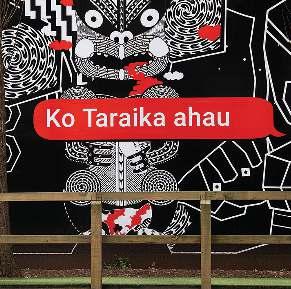





Cambridge University Press 978-1-009-22018-7 Game Changer Level 3 Student's Book and Workbook with
Series: Game Changer Excerpt More Information www.cambridge.org © in this web service Cambridge University Press
Digital Pack
Home | Posts | About me 1 2 3 4 5
A Maori graffiti
“Maori is part of our cultural identity,” says Turei Rarere.
KIA ORA! KIA ORA!
Cambridge University Press
978-1-009-22018-7 Game Changer Level 3 Student's Book and Workbook with Digital Pack Series: Game Changer Excerpt More Information
Read the article quickly and check (✓) the correct answers.
1 The topic of the article is …
a the Maori language.
b keeping languages alive.
c the importance of the Internet.
2 The article’s main idea is that teenagers…
a can help make their culture stronger.
b learn languages more quickly than adults.
c are spending too much time online now.
1.06 Read and listen to the article. Check your answers in Exercise 1.
Read the article again. Match a–e with paragraphs 1–5 in the article.
a an introduction about Turei 1
b a description of Turei’s online activity

c an example of how Turei’s idea is helping people from other countries
d the event that gave Turei an idea
e what Turei wants to do when he leaves school
WORDS IN CONTEXT
4 5
Replace the words/phrases in bold with words/phrases in the article. Use a dictionary to check your answers.
1 What are the original, native languages in your country? indigenous
2 Turei likes to help people who want to learn their grandparents’ language.
3 My mother started her own business and I’m going to do the same thing
4 When I talked to Turei, I understood for the first time he was a special teenager.
5 Turei is sure about what he wants to do in the future.
Match 1–6 with a–f.
1 Alexandra e
2 English
3 Maori
4 Terena
5 Turei
6 Turei’s aunt
a is an indigenous language teacher.
b is an official language in New Zealand, together with English.
c is an indigenous language in Brazil.
d is useful for connecting people all around the world.
e can use the native language of her community now.
f wants to teach Maori in the future.
WEBQUEST
THINK!
Why do you think the teenagers sometimes interact in English in Turei’s group?
Do you think it’s important to know English to exchange ideas with people around the world?
1.2
Check (✓) the numbers you think are correct. There are around indigenous languages in Papua New Guinea. The country recognises languages as official languages.
850/4
1000/8
550/2
1 Which three languages do Tomasz and Veronique's children speak?
2 How many languages are there in Nigeria?
www.cambridge.org © in this web service Cambridge University Press
VIDEO
1 2 3
UNIT 1
Cambridge University Press
978-1-009-22018-7 Game Changer Level 3 Student's Book and Workbook with Digital Pack Series: Game Changer
SPEAKING
1.07 Read and listen to Vanessa and Martina. What course are the girls discussing?
Vanessa This is so cool! I think I’ll study robotics when I leave school

Martina Oh really? Is that how you see yourself ten years from now? Making robots?
Vanessa Definitely! I know I’m good at this, and I love it. What about you?
Martina Well, I’m not sure. I don’t really know much about robotics, but yeah, maybe I’ll go for it, too.
LIVING ENGLISH
2
Match the expressions (1–3) with their meanings (a–c).
1 definitely
2 I’m not sure
3 maybe
EXPRESSING CERTAINTY AND UNCERTAINTY
a I think it’s possible
b I’m certain
c I’m uncertain
1.08 Listen and repeat the expressions. 3
PRONUNCIATION

1.09 Listen and pay attention to the pronunciation of ’ll and will. I’ll study robotics in college. People will use robots at home.
1.09 Listen again and repeat.
1.10 Do you hear ’ll or will? Listen to six sentences and write 1–6 in the chart.
’ll will
1.07 Listen to the dialogue again. Then practice with a partner.
Role play a new dialogue. Follow the steps.
1 Change the words in blue to write a new dialogue in your notebook.
2 Practice your dialogue with a partner.
3 Present your dialogue to the class.
Excerpt
www.cambridge.org © in this web service Cambridge University Press
More Information
1 4 5 6
1
class
YOUR DIGITAL PORTFOLIO
Record your dialogue and upload it to your
digital portfolio.
7 8

























































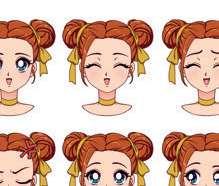































































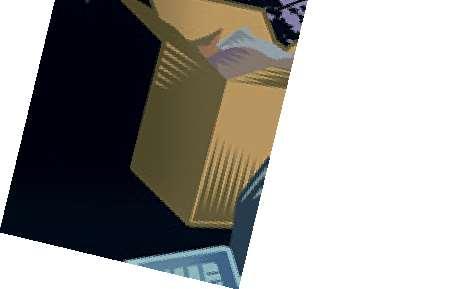


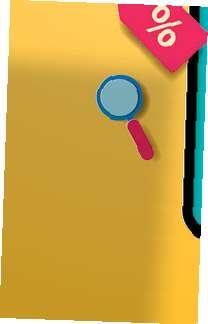




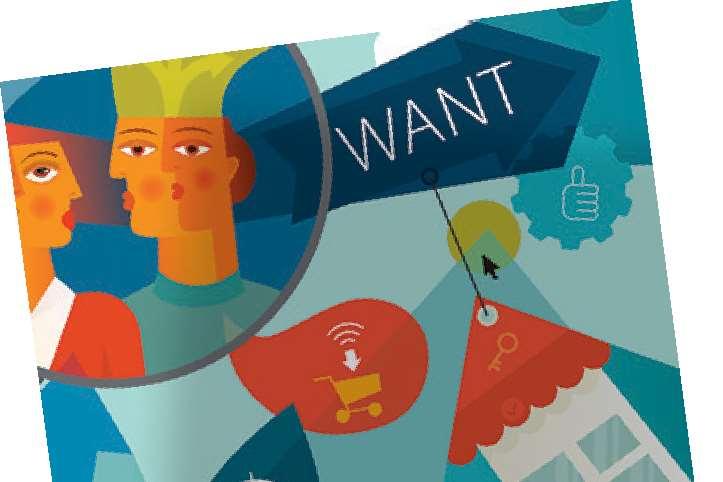
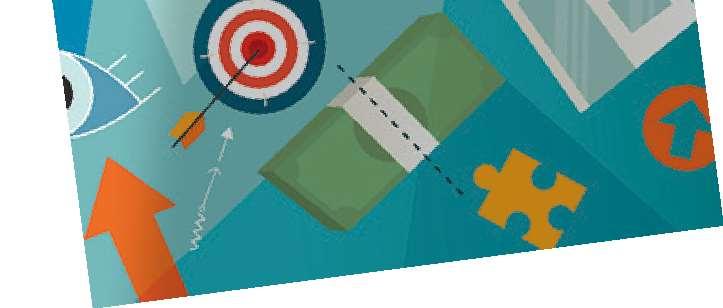



















7 AFRICA: PAST, PRESENT, AND FUTURE
UNIT GOALS
• Talk about achievements.

• Read an article about African innovation.

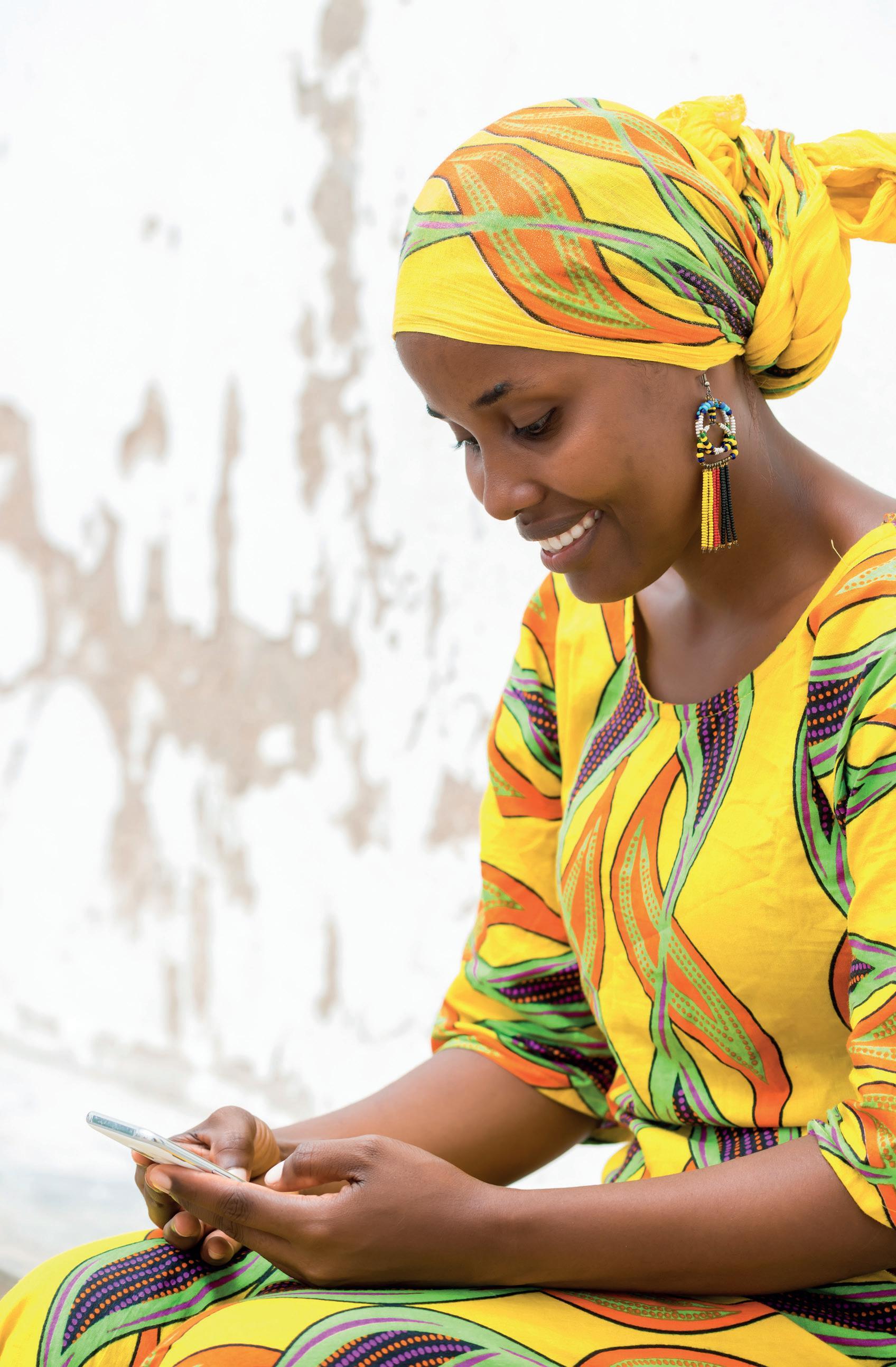
• Listen to a podcast about a movie.
• Learn about the Himba people of Namibia.

• Present new information.

THINK!
1 When you think of Africa, what facts and images do you think of?


2 Look at the pages in this unit quickly. Do the topics and images match your ideas? Do they give you other ideas?
VIDEO




7.1


1 How many countries are there in Africa?
2 How many languages do people speak in Africa?
75
ACHIEVEMENTS

7.01 Circle the correct options to complete the fact file. Then listen and check.
Great Civilizations of Ancient Africa
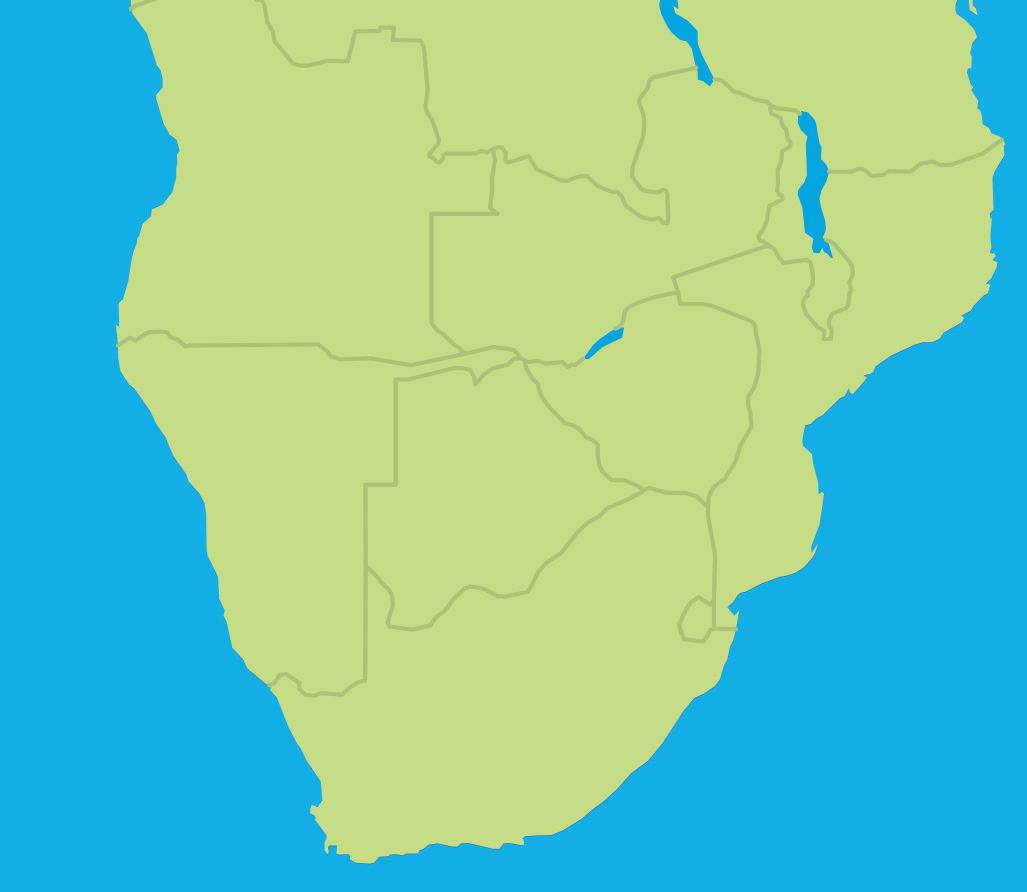
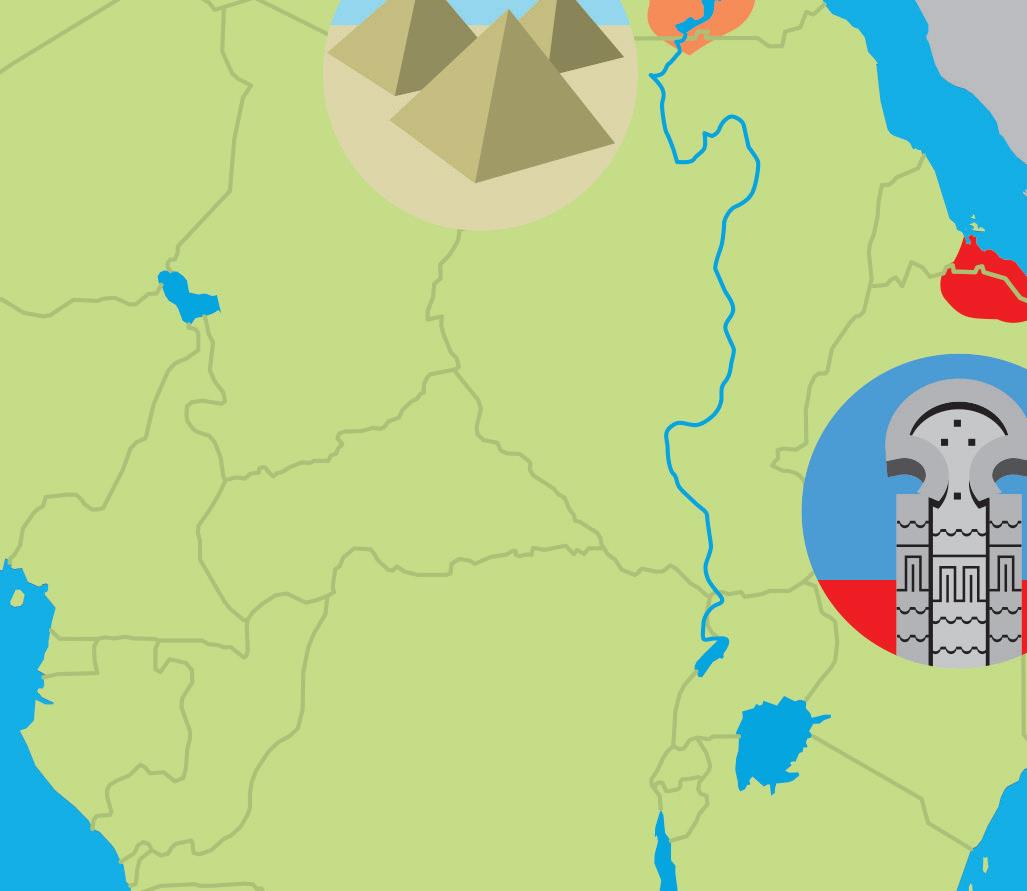
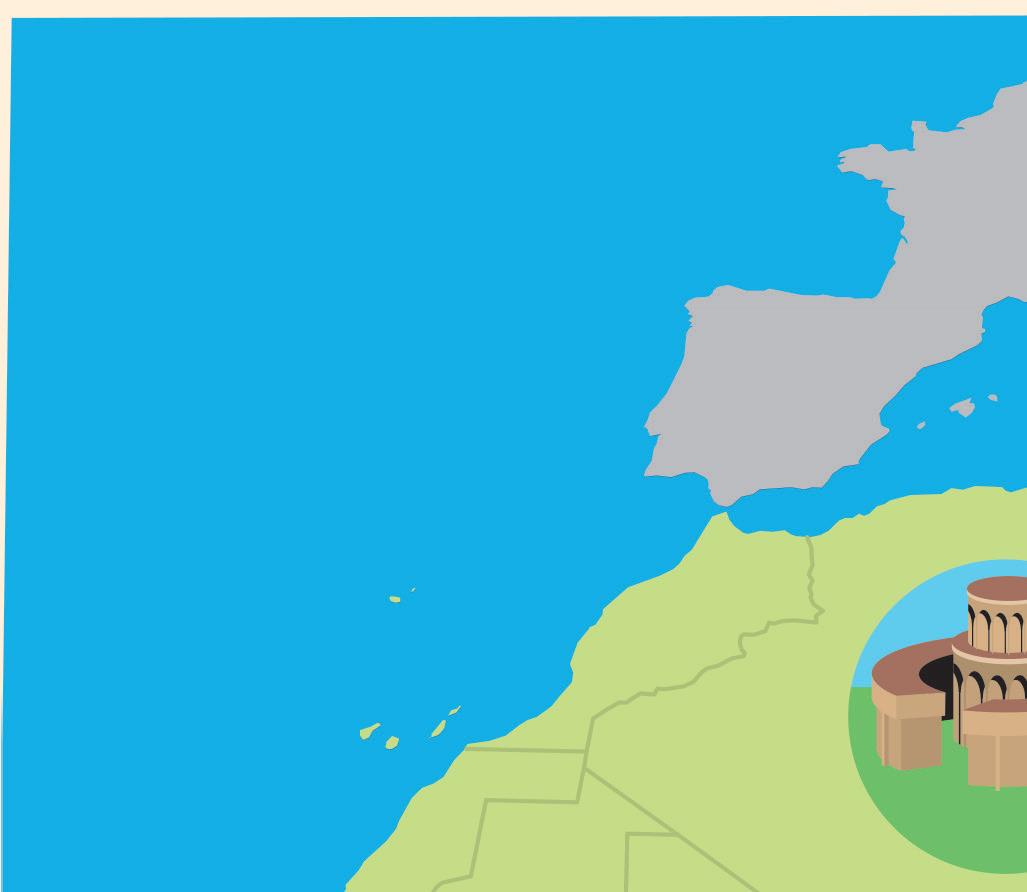
The city of Carthage was the center of an important empire until the 2nd century BCE. It was famous for the 1produce / production of a purple pigment of great value. Wars with Rome destroyed the city, and most of the ruins we can see today are Roman buildings.
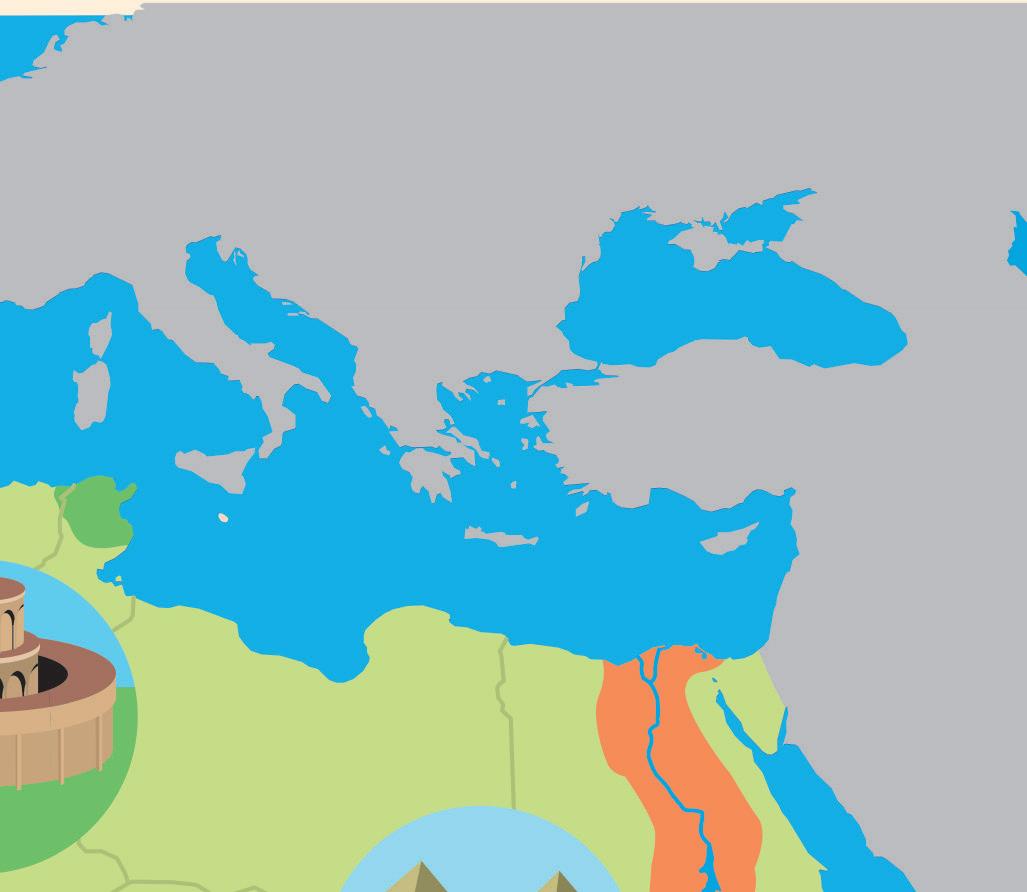
The ancient Egyptians are famous for their 2achieves / achievements, including the 3develop / development of a complex writing system called hieroglyphics. No one knew how to read it until the 4discover / discovery of the Rosetta Stone in the 18th century.
The Mali Empire was one of Africa’s greatest civilizations. King Mansa Musa (1280–1337), the richest person the world has ever seen, used his money to 5construct / construction amazing buildings in Timbuktu.
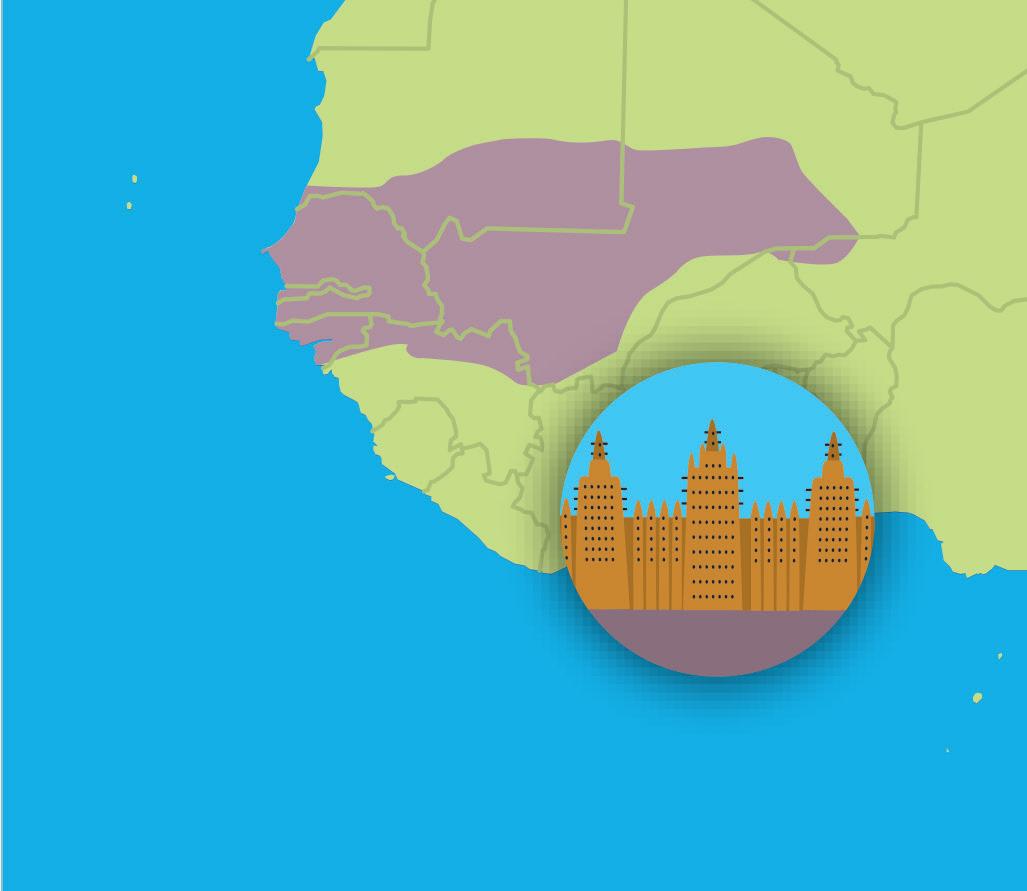
ATLANTIC OCEAN
The people of Aksum (also called Axum) 6organized / organization commerce between Africa and India, and their empire had great influence until the 7th century. Some of the huge obelisks they built still 7survive / survival today.
INDIAN OCEAN


1 VOCABULARY IN CONTEXT
76
7.02 Complete the charts. Then listen, check, and repeat.
Check (✓) the correct missing words in the sentences.
1 The … of the Cape Town Stadium took almost three years.
a achievement b construction
c survival
2 Kenyan runners have … great success in the Olympic Games.
a achieved b discovered
c organized
3 The … of gold in the late 19th century brought thousands of people to South Africa from all over the world.
a organization b development
4 Factories use robots for the … of cars.
a achievement b production
c discovery
c survival
5 To …, pandas need to eat 12–38 kg of bamboo every day.
a survive b achieve
c organize
6 Albert Sabin …. the oral polio vaccine in the 1950s.
a organized b constructed
c developed
Complete the chart using your own ideas.
Something you’ve achieved this year
A discovery you’ve made recently
An organization you belong to
Something that’s necessary for your survival
The most important item your country produces
Work in pairs. Take turns asking and answering questions about your information and your partner’s information.
What have you achieved this year?
I’ve learned how to write a rap.
When did you do that?
Verbs Nouns Ending in –ment 1 achieve 2 develop achievement Verbs Nouns Ending in –tion 4 5 6 produce construction organization Verbs Nouns Ending in –y 3 discover Verbs Nouns Ending in –al 7 survival
2 3
✓
4 5
USE IT!
WORKBOOK p.137 PRACTICE EXTRA 77 UNIT 7
READING
Look at the title, headings, and images in the article. Circle the correct options in the sentence below. The article is about technological inventions / survival techniques that some people have developed / might develop in a country / continent
Looking for innovation?
Here’s Africa for you
Roy Allela’s niece was born deaf and has to use sign language. Because no one in Allela’s family could communicate with her, he designed a translation glove: his niece wears the glove and connects it to a phone. The phone then translates her hand movements into an audio message. Allela’s dream is to see these gloves in all Kenyan schools that have deaf students. He hasn’t achieved this objective yet, but he’s working hard on it.
A large and young population that wants change. Countries like Rwanda and Ethiopia, examples of the world’s fastest growing economies. Many problems to solve. These ingredients make Africa the perfect place for innovation. In fact, some recent African developments have already surprised the world.
Electronic waste from around the world is one of Africa’s big problems. Afate Gnikou from Togo has decided to do something with it: he has constructed 3-D printers using parts of old computers, scanners, and other electronics. He now works with a lab which has given these printers to local schools. In the future, Gnikou wants to use these printers to make medical equipment to help disabled people.

There is six times more water in the air than in all the rivers on Earth. During a drought in 2016, when Kenya had almost no rain, Beth Koigi had a brilliant idea: her Majik Water invention uses a chemical process to take water from the air and convert it into drinking water. She has already produced a prototype of her invention.
7.03 Read and listen to the article. What motivated these people to create something?
Write A (Allela), G (Gnikou), or K (Koigi). There is one extra answer.
1 a problem with old objects



2 money difficulties
Write T (true) or F (false).
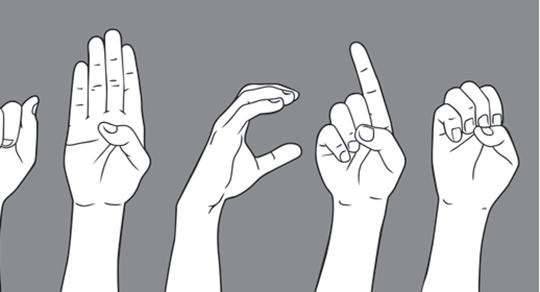
3 a problem in the family
4 extreme weather conditions
1 The article lists three reasons to explain why there are many innovations in Africa. T




























2 Allela’s invention produces a written message on a phone screen.
3 For his 3-D printer Gnikou uses materials that people have thrown away.
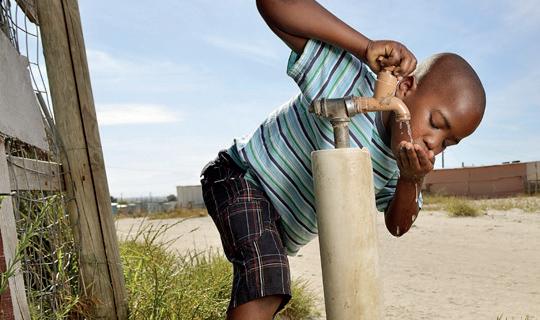
4 Students near the lab Gnikou works with are making medical equipment with their printers.
5 Koigi’s Majik Water produces cleaner drinking water from rivers.
6 The three inventors have done everything they wanted to achieve.
THINK!
Each of these innovators invented something to solve a problem. What problems do you see around you and what inventions might help solve them?
WORKBOOK p.139
2 3
1
Looking for innovation? Here’s Africa for you
Smart gloves for sign language
3-D printers from e-waste
78
Water from the air
LANGUAGE IN CONTEXT
Look at the examples below. Complete the sentences from the article.
Present Perfect with Already, Just, and Yet Already Just Yet
I have already finished my homework.
Beth Koigi 1 a prototype. Some African developments 2 the world.
I know Felipe is at home. I’ve just spoken to him. It’s just started raining. Let’s stay here.
My brothers have just gone out. They left five minutes ago.
Put the words in the correct order to make sentences and a question.
1 lives / invention / already / This / improved / our / has This invention has already improved our lives.
2 have / posted / I / photos / some / online / just

3 haven’t / The / the / downloaded / students / yet / file
4 We / the / events / organized / have / sports / already
5 yet / company / developed / Has / an / the / app ?



We haven’t uploaded the file yet. Roy Allela 3 this objective
Have you met my cousin yet? Have scientists discovered a cure yet?
LOOK!
Use already and just after have/has. I have just received your email. She has already written the summary.
Tamara has to write a blog post about an African invention. Look at her checklist and write what she has and hasn’t done. Use already, just, and yet.
1 She has already chosen the invention.
1 choose the invention ✓
2 search for information ✓
3 write the rst draft
4 ask a friend for feedback
5 produce the nal version
USE IT!
4 5
Write sentences about yourself with already, just, and yet in your notebook. Use the ideas below or your own ideas.
• do all my homework for tomorrow

• learn how to use already, just, and yet
• finish Exercise 3
• take driving lessons
• have lunch
• turn 15
Work in groups. Take turns reading your sentences to the group. Discuss the sentences and then tell the class some information about your group.
Adriana has already done all her homework for tomorrow.
Pedro and I haven’t finished Exercise 3 yet.
1 2 3
WORKBOOK p.136 and 138 PRACTICE EXTRA
2 3 4 5 79 UNIT 7
LISTENING AND VOCABULARY
1 Have you ever heard of skimboarding? Have you ever done it?
2 Do you think skimboarding is a cool thing to do? Why / Why not?
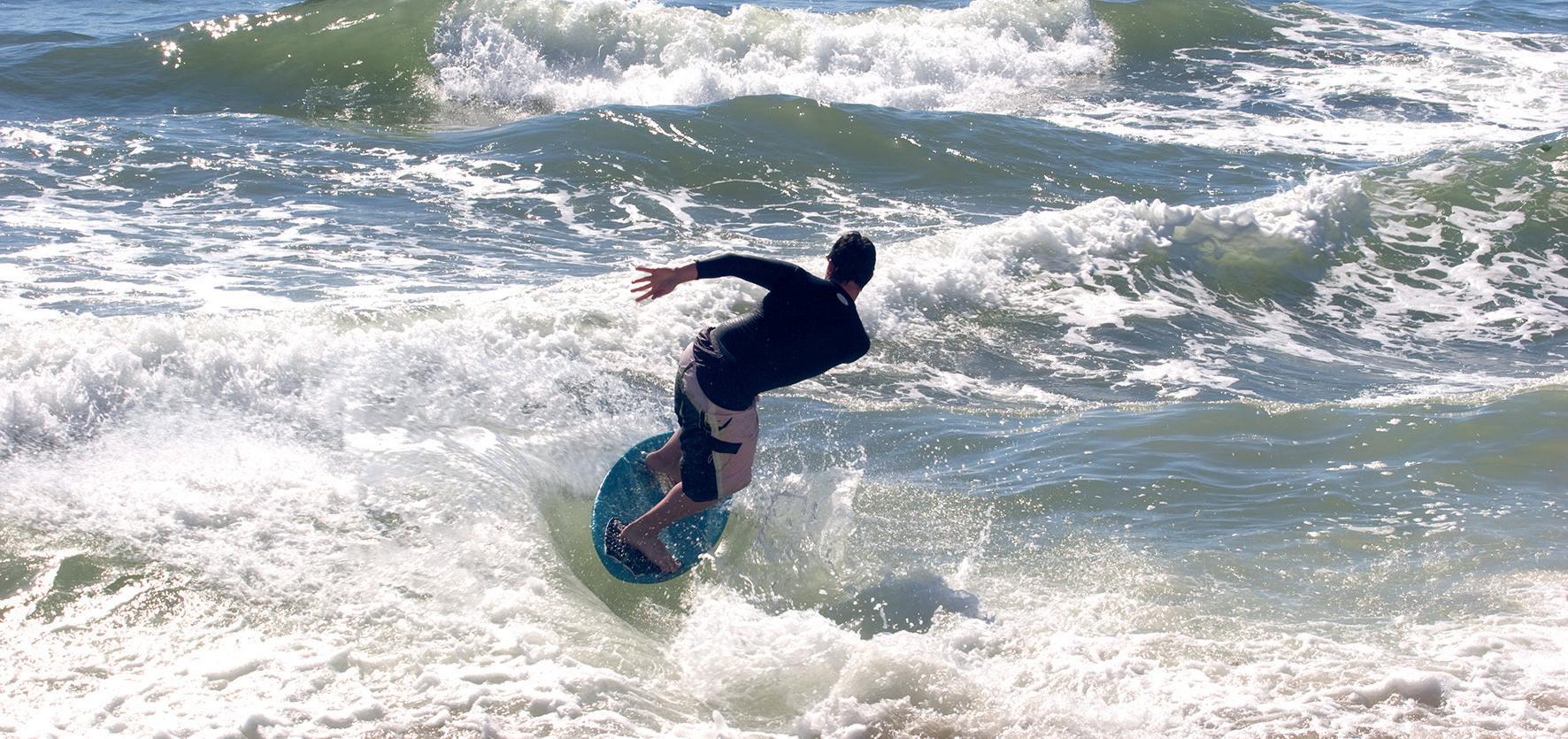
7.04 Listen to the beginning of a podcast. Match 1–4 with a–d.
1 The name of the podcast is
2 Today’s episode is about
3 The title of the movie is
4 The director of the movie is
a a movie about a skimboarder.
b Skimboarding Pro.
c Dlamini Pod.
d Sofia Vieira.
7.05 Listen to the whole podcast and circle the correct options.
1 Sofia has made several movies about Angola / surfing
2 Pedro spent a lot of time watching the surfers / skateboarding near the beach
3 When he started skimboarding he knew a lot / didn’t know anything about the sport.
4 In 2019 a movie director / some sports people saw that Pedro was good at skimboarding.
5 The movie has received positive / negative reviews.
6 The critic believes Sofia’s movies are successful because she loves Angola / telling stories
7.06 Complete the b sentences using a word from each box so that they mean the same as the a sentences. Then listen, check, and repeat the phrases.
• afraid • famous • good
• interested • proud • tired
• at • for • in
• of • of • of
1 a Waiting for the bus always makes me feel impatient.
b I’m tired of waiting for the bus.
2 a My brother sings well.
b My brother is singing.
3 a Everyone knows about Brazil’s beaches.
b Brazil is its beaches.
4 a Spiders don’t make me feel scared.
b I’m not spiders.
5 a I don’t like kayaking anymore.
b I’m not kayaking anymore.
6 a My dad’s paintings make him feel good about himself.
b My dad is his paintings.
WORKBOOK p.137
Look at the image of a man skimboarding. Then work in pairs and discuss the answers to the questions.
1
2 3 4
80
LANGUAGE IN CONTEXT
Complete the sentences from the podcast in the chart. Use the words below and since or for.
• ’s been ... a few weeks • ’s received ... the opening night • ’ve been … many years
Present Perfect with Since and For Since For
I’ve lived in Angola since 2021.
You’ve studied French since February
Sofia has made movies about Angola since she left college.
It 1 excellent reviews
I 2 a big fan
You’ve been my English teacher for a long time
It 3 in movie theaters
We’ve watched TV for two hours.
How long have you known Marco? I’ve known him since I was 11. / I’ve known him for four years
How long has your sister played the guitar? Since last year / For ten months
Complete the sentences with for or since.
1 My father has liked painting since he was a teenager.
2 I’ve played the piano I was six years old.
3 Here’s a snack. You haven’t eaten anything hours!
4 My cousins have had a vlog two years.
5 South Africa has been an independent country 1910.
6 This company hasn’t developed a new product a long time.
Write questions with how long and answer the questions.
1 you / be / at this school? (since)
2 you / live / in your neighborhood? (for)
USE IT!
LOOK! Use the present perfect with since. I have known my best friend since I was five. (= We have been friends for ten years.)
3 you / know / your best friend? (since)
4 5
Check (✓) Yes or No so that the answer is true for you. Yes No
Do you play a musical instrument?
Do you have a pet?
Are you interested in sports?
Do you have a smartphone?
Do you play a musical instrument?
Yes, I play the guitar.
Work in pairs. Take turns asking the questions in Exercise 4. When your partner answers Yes, find out more information by asking a question with How long.
81 UNIT 7
1 2
3
How long have you played it? WORKBOOK p.136 and 138 PRACTICE EXTRA
4 your English teacher / be / in the classroom? (for)
AROUND THE WORLD



The Himba




The Himba almost disappeared in the 1980s because of war and drought. Since then, their population has grown. People think there may be more than 25,000 Himba in Namibia today.
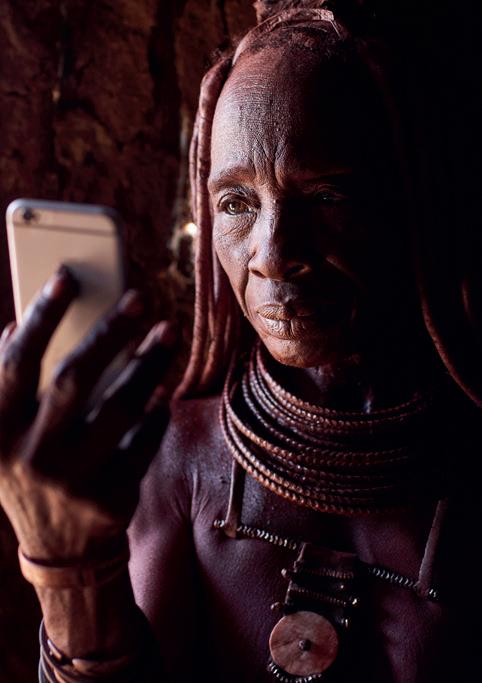

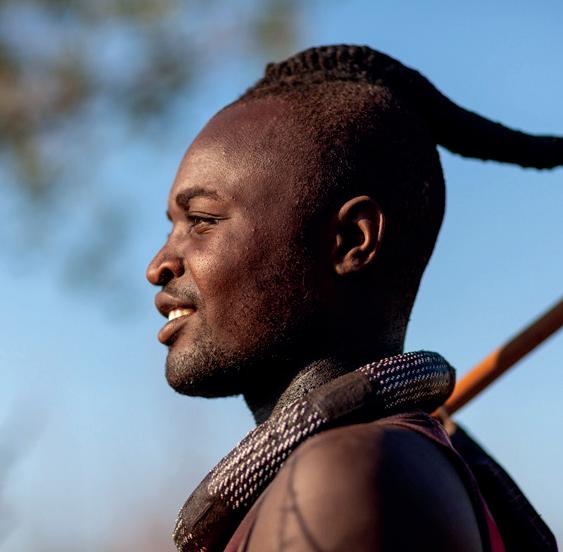
Good thinkers
The modern world hasn’t had much in uence on traditional Himba culture. That’s why scientists are interested in studying the Himba. One of the questions scientists want to answer is: “Do the Himba think in the same way as people in other societies?” The results of some studies have shown that the Himba are better at nding creative ways to solve problems. Also, their attention to detail is amazing and they achieve better results on tests like the Ebbinghaus illusion than many other people.
Himba ways
In Himba society the men make political decisions and look after the cows and goats. The women milk the animals, carry water to the village, cook, and build their huts.
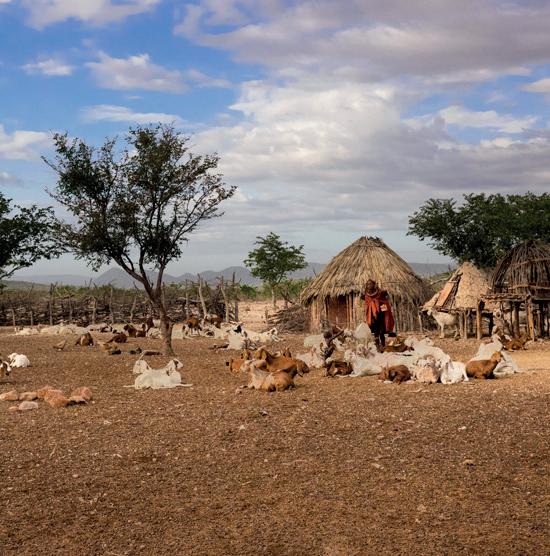
Himba women and men are famous for their complex hairstyles. Girls, women, older boys, and men all wear their hair in braids, but in different styles. Some young girls wear braids over their faces and older girls start wearing a headpiece made of goat skin, which looks like three leaves. After getting married or having a child, they wear a different headpiece. Himba women also cover their bodies with butterfat – the fat from cow’s milk – and red coloring.
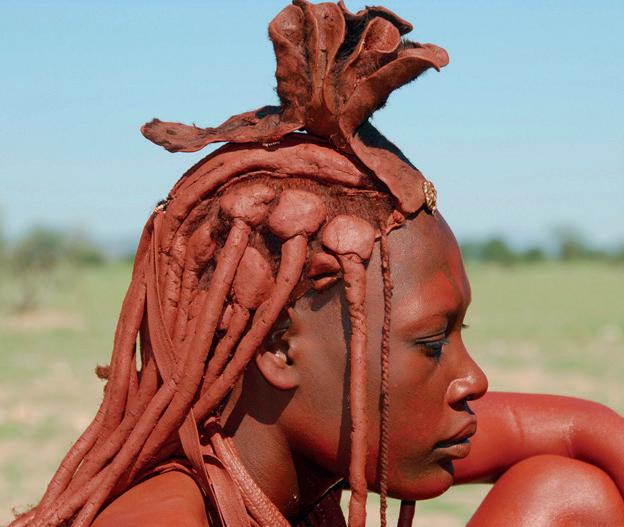
Tradition and modern life
Since Namibia’s independence in 1990, some things have changed for the Himba. Some young people have already left their villages to get a job or go to school. Some haven’t come back. In the villages, some Himba think integration with the modern world is necessary, while others think it will destroy their culture. Time will tell.
82
The Ebbinghaus illusion: which orange circle is bigger?
1 2 3 4 5
Look at the text. Check (✓) the correct options.
1 The text is from … a a story book for children.
b an encyclopedia for young people.
c a history textbook for teenagers.
2 The objective of the text is to …
a tell a story about an African family.
b explain how some African people lived in the past.
c give information about an African society.

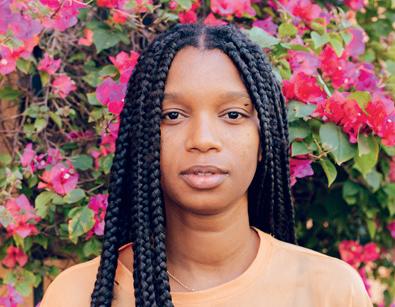
7.07 Read and listen to the text. Check (✓) the false sentence.
1 Most Himba people have kept their traditional culture.
2 In Himba society, hairstyles have important meanings.
3 Scientists have tested the way Himba people think.
4 The Himba population today is smaller than in the 1980s.
Circle the correct options.
1 In Himba society men and women share / don’t share the same responsibilities.
2 Himba men don’t have to take care of animals / construct homes
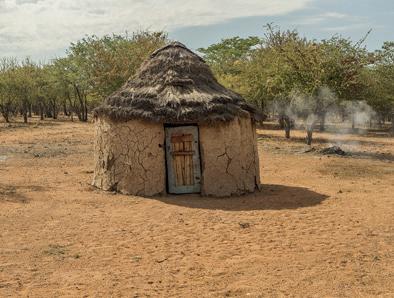
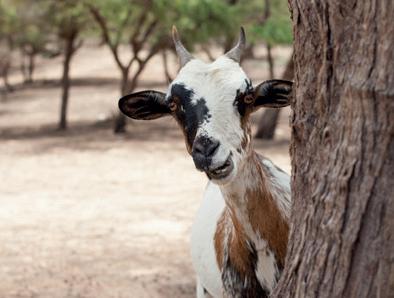
3 Women change their hairstyle / skin color when they get married.
4 The Himba have shown that they can develop illusion tests / think creatively.
5 The Himba are good at / proud of concentrating on details.
6 All / Not all Himba who get a job come back to their village.
WORDS IN CONTEXT
Find these words in the text and label the images.
In your notebook, write captions for images 1–5 in the text. Use the words in Exercise 4 and information from the text.
WEBQUEST
THINK!
Think about an indigenous society you know (from Africa or from another continent). What are the people good at? What can they teach other societies?
VIDEO
Learn more! Check (✓) the correct answer. Which orange circle is bigger in the Ebbinghaus illusion? What other illusions like this can you find?
the circle on the left the circle on the right the circles are the same size
1 What's a djellaba and where do people wear them?
2 What is the name the fashion show that appears in the video?
1 2 3
•
•
•
4
goat
hut
leaves • braids
7.2 a b c d
5 UNIT 7 83
7.08 Read and listen to the vlog. Then match 1–3 with a–c.
Rafaela Hi, I’m Rafaela and welcome to my music channel.
OK, so for a long time I’ve wanted to find a way to hear the best of new African music. And guess what? I’ve just found out that there’s the perfect app – it’s called Music&More. Basically, you choose the country or type of music you like. Then the app shows what teenagers around the world have listened to and liked recently. This is how it works …
1 The vlog is about
2 In Music&More you can select
3 The app shows
LIVING ENGLISH
a “Nigeria” and “rap,” for example.
b the music other teenagers have enjoyed.
c an app that introduces you to new music from Africa.

Complete the chart with the expressions below.
• basically, … • guess what? • I’ve just found out …
Expression used to introduce …
1 a summary of the main information
2 something exciting
3 information you’ve discovered recently
7.09 Listen and repeat the expressions.
7.10 Listen and pay attention to the different pronunciations of –ed. /t/ liked /d/ listened /ɪd/ wanted
7.10 Listen again and repeat.
7.11 Listen and complete the chart with the correct words below.
• decided
lived
searched
played
posted • searched • walked
7.08 Listen to the vlog again. Then take turns reading the vlog to a partner.
Role play a vlog about an app you’ve started using recently. Follow the steps.
1 Decide on the topic of your app: music, food, movies, art, or sports.

2 Write the text for your vlog in your notebook. Use the vlog in Exercise 1 for ideas.
3 Take turns reading your vlog to a partner and comment on your partner’s vlog.
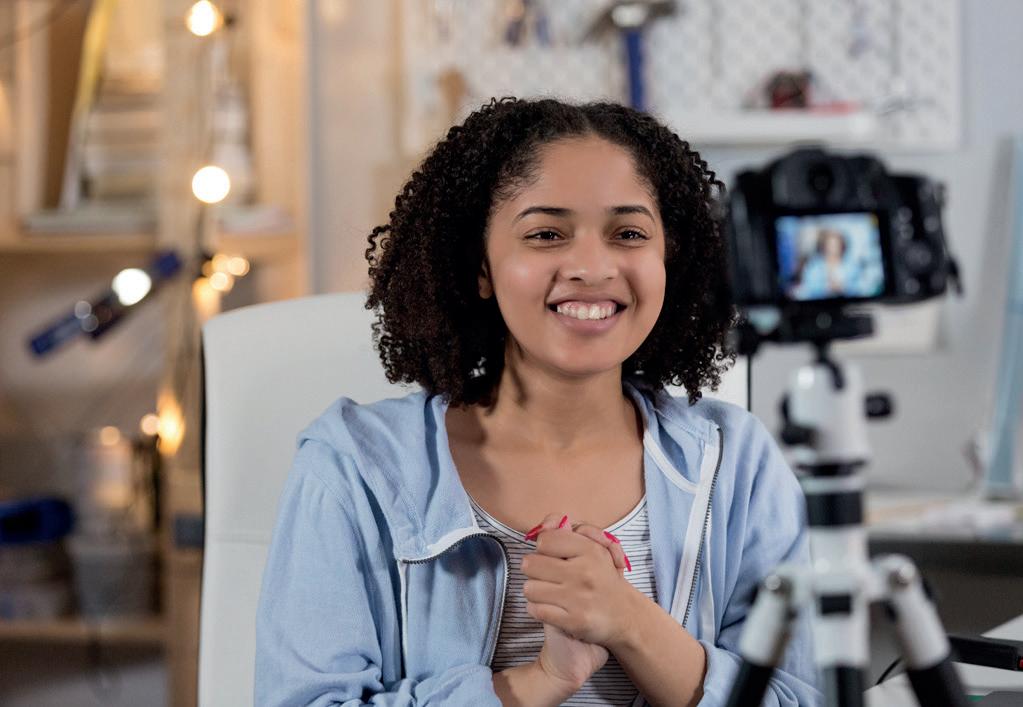
1 2 3
PRESENTINGINFORMATIONNEW SPEAKING PRONUNCIATION
4
5
•
•
•
/t/ /d/ /ɪd/
6 7 8
your dialogue, then upload it to your class digital portfolio.
DIGITAL
Record
YOUR
PORTFOLIO
PRACTICE EXTRA 84










































































































































































































































































